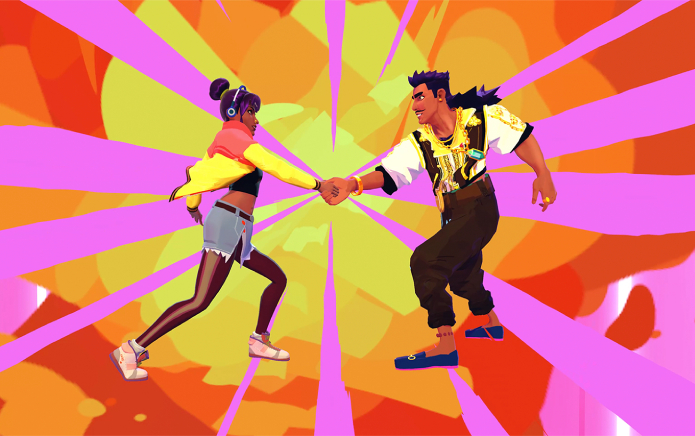Another very queer game I’ve played is The Cosmic Wheel Sisterhood. Highly recommended if you identify in any way as a queer woman (cis, trans or non-binary). Such a great story, meaningful decisions and trans-inclusive (although they exclude non-binary people and everyone else who doesn’t identify as a woman which is annoying).
Are queer breakups more messy than straight breakups? I don’t have a whole lot of experience in either, so I’m curious.
I think it’s important to note that queer breakups do not need to be more messy than straight breakups and that just because queer people breakup does not mean that it is necessarily more messy. But exploring how messy they can be is different than making a statement that they always are. While the full depth of exploring the differences between queer and straight relationships is an entire body of literature and a great PhD thesis, I’ll try to summarize some high level ideas that come to mind for the purposes of educating those who are unfamiliar or have not thought a lot about these dynamics:
- Queer folks tend to have much more tightly knit social circles. This is because they are ostracized or discriminated against by plenty, so they have to be more careful with whom they form tight community with.
- Queer folks are often alienated from their families, placing additional emphasis on being social and getting needs met by their community.
- Queer folks may be still processing their own sexuality, gender, or other form of queerness and that can be reflected within the relationships that they hold.
- Queer folks might change or recognize an identity that ends up being fundamentally incompatible with the original relationship, such as by transitioning to another gender.
- Because of the strong community and social ties, breaking up with someone can cause rifts in social circles which are both smaller and more important to queer folks, which can end up rather messy because emotions are running high.
- Queer relationships are more expansive by nature, because they challenge common narratives around gender - you cannot simply categorize things as being the man or the woman’s job, when one of the two may not be present, and for those who are transgender there may be challenging of those roles as well.
- Due to the unique nature of queer lives and discrimination, many milestones in a relationship look very different. In most cases kids cannot be conceived of biologically between the two partners and there may be no desire to adopt or have children/start a family. There may be a stronger desire to create a shared space for a shared family. Moving in with each other may happen sooner due to financial strain. There may be no “meeting the parents” or an equivalent. How quickly sex is on the table and how physically intimate two folks are with each other may not represent common narratives.
- Queer folks are more likely to be polyamorous or to practice something not resembling strict monogamy which can lead to different kinds of conversations, fights, and breakups.
- Queer folks may exist on the asexual and aromantic spectrums which may effect how others perceive the relationship, what the relationship milestones may look like, and provide unique considerations with regards to balancing a relationship with their life, and ultimately what a breakup may entail or look like.
- The marginalization of queer folks leads to increased stress which can make breakups more explosive due to compounding stress.
- Queer folks may feel more free to express themselves in ways that do not fit neatly into societal expectations around gender roles, and this can be reflected in the breakup itself and what is considered acceptable or normal behavior during a breakup.
- Queer folks might approach dating differently and the considerations around maintaining a friendship post-breakup may not represent common narratives.
As I stated before this is a non-exhaustive list, and only captures some of the ways in which queer relationships can differ significantly from cis/straight relationships and how that might reflect in the process of ending a relationship or breaking up. For what it’s worth, I think the game approaches this quite well, with a variety of relationships playing out throughout the story and many of the points above being salient to each unique relationship and breakup in the game.
People are just people, why would it be any different for gay folks? Just click baity article bullshit
@Shake747@lemmy.dbzer0.com @Big_Boss_77@lemmynsfw.com
Not everyone is treated the same way. Queer folks get marginalized in plenty of ways that cis/straight folks do not. Queer relationships in their very nature cannot mirror cis/straight relationships, either. It is entirely unsurprising that relationship dynamics would be different, and this comment dismisses all of this and minimizes the importance of queer representation in media.
I’m leaving your comment up because I think conversation on why and how queers experience differing relationships is important, but I do need to remind you that our only rule on beehaw is to be nice and this comment isn’t particularly nice.
Im hetcis and still remember broking up with my gf and receiving support from all my friend and family, while my lesbian friend only had just me and another friend to support her, because her family didn’t believe her she was lesbian (“is just a phase” bullshit). It was obviously way harder for her, with her family basically saying that her feelings were invalid.
My breakups usually involve some level of internalised transphobia directed at me for being nonbinary. I’ve only ever dated fellow trans people, but, well, the patriarchal brainwashing goes deep. Usually my partners only notice their hangups after a month or so with me. The feelings are buried, and being with me unburies them. Sometimes the problems are solvable, often they are not.






